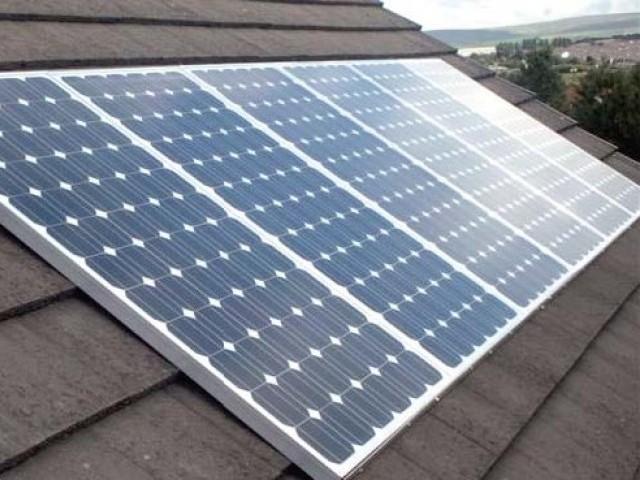Islamabad:
The Committees of the National Assembly and the Finance of the Senate have rejected the proposed imposition of a sales tax of 18 percent in the solar panels, citing concerns about their potential negative impact on the adoption of green energy.
The decision occurred during the deliberations on the Financial Law for Fiscal Year 2025-26 on Tuesday, which includes a wide range of reforms and amendments amended to expand the tax base and strengthen the application.
The Permanent Finance Committee of the National Assembly, chaired by Syed Naveed Qamar, discussed the proposed tax in detail. The committee expressed a unanimous opposition, and Qamar said that all political parties had already expressed their disapproval of any solar energy tax.
He warned that such a measure could discourage change to renewable energy and undermine environmental objectives.
Read more: The Government slaps the RS415B taxes to collect RS2.2tr
The president of the Federal Income Board (FBR), Rashid Mahmood Langial, clarified during the meeting that the tax would not apply to totally imported solar panels and ready to install, but instead it would be directed to the imported components used for local assembly. However, this clarification did little to calm the committee’s concerns.
The Minister of Finance, Muhammad Aurengzeb, agreed with the position of the committee, observing that the price of solar panels had decreased significantly in recent years, making them more accessible. He assured the members that the Government would meet their income objectives through alternative means, which include taxing and increase carbon leaflets.
During the same session, the Committee reviewed the amendments proposed to sections 37a and 37aa of the Finance Law, with the aim of curbing the large -scale fiscal fraud.
According to the new provisions, the persons involved in fraud greater than RS50 million may be subject to arrest. FBR officials explained that the process would imply the issuance of three notices before any arrest, and the measure reserved for cases where there is a flight risk.
Also read: 18% sales tax in vehicles up to 850cc proposed
Aurengzeb stressed the need for safeguards to avoid abuse of these powers. He said that arrest decisions would be reviewed by a three -members committee within the FBR and reaffirmed that the prime minister had ordered that the improper use of the arrest provisions be strictly avoided.
The finance minister also confirmed plans to gradually reduce subsidies, including those that benefit the solar sector, as part of the efforts to rationalize fiscal policy.
Simultaneously, the FBR will seek a stricter application against unregistered entities and can resort to freezing bank accounts or closing non -compliant businesses.
The members of the committee also raised concerns about illicit trade in the tobacco sector. While supporting a stronger application to curb tax evasion, several legislators warned against the grant of unofficial powers to application agencies, warning that it could lead to corruption and harassment.
Read more: Automatic sector divided into a new budget
Separately, the Committee reviewed the government’s decision to withdraw the Federal Special Tax on Inmovible Property in the next fiscal year, pointing out its conflict with the laws governing mobile assets.
The debate on the increase in taxes on small vehicles as part of Pakistan’s commitments with the International Monetary Fund (IMF).
The sales tax on cars of less than 850cc has risen from 12.5 percent to 18 percent, which caused criticism of the members who argued that the measure disproportionately affects the middle class.
Although a decision was not made to withdraw the increase, the committee recommended a policy review to relieve burden for consumers.
The deliberations of the finance committees reflect the widest challenge facing the government, since it tries to improve income without stopping economic activity or undermining public welfare.




